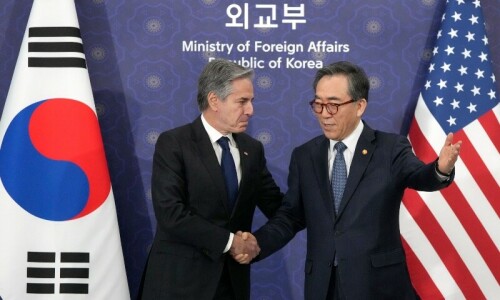KARACHI: The country’s current account deficit almost doubled in March to $1 billion compared to the preceding month, taking the total gap during the first nine months (July-March) of the ongoing fiscal year to over $13 billion.
The latest data issued by the State Bank of Pakistan (SBP) on Saturday could be shocking for the new government, which is in negotiations with the International Monetary Fund for the release of $1 billion.
Since the beginning of the current fiscal year, the government has failed to control the widening trade deficit, which is leading to higher current account deficits.
“Despite high global commodity prices, the turnaround in the current account continues, with a deficit of $1bn in March, $500m lower than the average during FY22. Moreover, the non-oil balance remained in surplus for the second consecutive month,” the SBP said in a Twitter post.
New govt may find it challenging to arrest rising CAD amid widening trade deficit
The current account balance — which measures the flow of goods, services and investments into and out of the country — was in a $13.169bn deficit during July-March against $275m a year ago.
The State Bank reported that the import growth was 41.3 per cent during the nine months compared to 11.5pc growth in the same period last year.
Goods and services imports cost a total of $62.137bn during July-March compared to exports of $28.855bn. Rising imports are widening the trade deficit and destroying the exchange rate, as the demand for dollars remained abnormally high during the current fiscal year.
Quarter-wise data shows that the current account deficit was $3.526bn in July-September, $5.565bn in October-December, and $4.078bn in January-March, averaging out at about $4.4bn per quarter. This means the deficit may touch $17.5bn by the end of the fiscal year.
The previous government attempted to reduce the import bill by introducing higher duties on imports, particularly on luxury items.
However, it failed to do so amid rising global oil prices. Pakistan paid over $14bn to import petroleum products during the July-March period, almost double the oil import bill a year ago.
The State Bank reported that the balance on trade in goods and services during July-March was in a deficit of $33.276bn compared to the $21.292bn deficit in the year-ago period.
These twin deficits would keep the new government restless while it requires multiple measures to get a hold of the situation.
A steep fall in the SBP-led foreign exchange reserves — currently at $10.8bn — allows speculators to destabilise the exchange rate.
Besides, to arrest galloping inflation, the interest rate was recently increased by 250 basis points to 12.25pc, and a further hike is expected.
Published in Dawn, April 24th, 2022









































